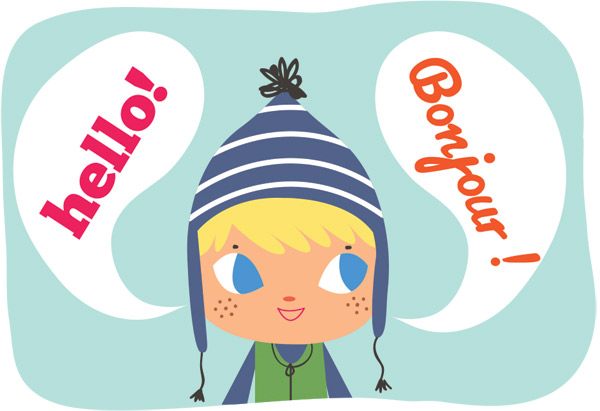In times of globalisation contact with other languages is inevitable. It is estimated that more than half of the population is bilingual. The increase in migration, intensive economic exchange and fast developing tourism industry force people to learn foreign languages. Mass media and modern means of transport enable us to spread languages even faster. International marriages have never been more popular. All of these factors contribute to the growing number of bilingual people. Among them, there is one particular group which seems to benefit the most. They are called simultaneous bilinguals: people who acquire two languages from birth.
http://images.huffingtonpost.com/2015-05-21-1432234752-9588891-Bilingual_kid.jpg
According to many studies, simultaneous bilingual children seem to exceed monolingual children in tasks requiring abstract thinking, executive control and greater attention. In addition to having a huge impact on the human mind, bilingualism also influences emotions and the perception of the world. Language always comes together with its culture. One may say that language shapes the way we see the world. The more languages we know, the deeper awareness about the world around us we have.
What is more, it was proved that bilingualism may alter neurological structures. The recent research conducted by scientists from the University of Ghent shows correlation between bilingualism and later diagnosed Alzheimer’s disease. It is a relatively new theory and more research needs to be conducted, however, it is likely that bilingualism may delay Alzheimer’s symptoms. If you want to know more about this research, here is the link:
On the other hand, for many years it was believed that bilingualism has a negative effect on children. This is mainly due to the fact that children who acquire two languages from birth usually start speaking later than monolinguals. Additionally, in the early stage of life they tend to mix both languages. In comparison to their monolingual peers they perform worse at vocabulary tests and their language abilities in each language are on a lower level.
https://2016bilingual.files.wordpress.com/2016/04/cropped-bilingual-comic1.jpg
In my opinion bilingual children catch up with their monolingual friends very quickly and excel in many other areas. I would say that disadvantages of simultaneous bilingualism are limited and in many cases they vanish as children get older.
What is your opinion? Do you think bilingual children have easier lives? Or is it better to firstly acquire one language well and then focus on others?
Sources:


Comments
In my opinion it's better to learn child one language and then - even if it would be in a very young age, start teaching him some foreign languages.
To not confuse and shock baby, one parent should speak to he or she in only one language. Doing this, they make baby feel natural hearing and speaking in two different languages.
I don't know if it has something to do with multilingualism but that kid was a little genius. They said that he was as capable as average 11 years old at the age of 6, but I think that in some ways he was brigthter than some (most) adults. He used to read whole semi-scientific books by himself. Impresive at his age if you ask me.
I was his babysitter and a kind of private teacher for a month in Austria. I usually don't like kids but we had a great time together. He had troubles with making contacts with his peers and really, really liked me because I was the only adult person ever treating him as an equal. It's funny that I had to show to a six yeras old that there are things apart from reading like for example building a dam made of rocks across a mountain stream.
1. It is easier to learn another language from birth than it is during any other time in life,
2. You will have a head start in school,
3. If you want to study more languages later in life, you will have a leg up. The differences in sounds, word order, stress, rhythm, intonation and grammatical structures will be easier to learn.
4. It helps you to develop superior reading and writing skills,
5. You will have a better analytical, social, and academic skills,
6. It helps you to feel at ease in different environments. It creates a natural flexibility and adaptability.
7. Career prospects are multiplied many times over for people who know more than one language.
I myself recognise it as a great idea to bring a child that way. That would give him/her better start in the future, wider perspective and natural ability to change languages when speaking.
There is nothing wrong in teaching kids different language, but it have to be done wiesely, so they won't have any problems with differentiation of which language is basic one, which one should be used in school, home or somewhere else. By learning foreign language young age kids will have less problem with languages in future, but learning process have to be adapted to kids capabilities.
http://www.bbc.com/future/story/20160811-the-amazing-benefits-of-being-bilingual
There is also an interesting paragraph about the fact that such persons sometimes have a split personality even than I see the same advantages of being bilingual.
I know a guy who is bilingual and to him it is like a blessing because he can work in Poland in his second language and it makes his skill very special and extraordinary.
I know one Ukrainian couple who live in Poland with their small son and daughter. And they kids speak Russian at home, Ukrainian in Ukraine and Polish at the kindergarten. The 5-year boy was helping us with the Polish words :)
As I mentioned in the other topic - kids need to start foreign languages as early as possible. I don't see the problem here.
They naturally will be able to communicate with others not only from their country.